Organic Chokeberries – The Pride of a Young Moldovan Farmer
Published: Feb 5, 2018 Reading time: 4 minutes Share: Share an articleMany young people in Moldova are tempted to start their own business, but only the most persevering manage to transform an idea into something real. Six years ago, Vitalie Pintilei, a young man determined enter the world of organic farming, turned his idea into a reality when he created his organic chokeberry business ‘Pronat-Agro’. Chokeberries, also known as aronia berries, are packed with essential phytonutrients, vitamins, and antioxidants and are considered by health experts as the most powerful untapped berry in the booming superfood world.

Today, Vitalie owns a five-hectare chokeberry plantation in Sofia village, Drochia district. In the spring of 2013, he planted his first hectare of young chokeberry bushes, which he had imported from Serbia. Shortly after, he applied to the Ministry of Agriculture to register as an organic farm operator. After three years spent transitioning from conventional to the organic farming, Vitalie was able to enjoy his first fully organic harvest in August 2016.
Supporting Organic Farming in Moldova
For organic farmers like Vitalie, the health of consumers and the quality of soil, water, air and food products are top priorities. USAID Moldova, People in Need and the Czech Development Agency are encouraging the pursuit of organic practices in Moldova by supporting farmers who enter the circuit. By supporting farmers in their careful cultivation of delicious and healthy produce, we are helping Moldova offer quality and competitive products, wanted by both domestic and foreign consumers.
To develop his organic farming business in Moldova, Vitalie sought and garnered support along the way. Initially, he worked with professionals to develop his ‘Live Fruit’ chokeberry brand, in order to distinguish his products on the domestic market. Further down the line, he received a grant from People in Need and USAID Moldova to purchase a solar-powered dehydrator to dry the berries, making him the only farmer in the country to have such equipment. In 2016, he started to build a refrigerating chamber, using his own as well as donors’ resources.
Chokeberries – the fruit of his labour – are, at this moment, a new product for Moldovan consumers. However, there are many opportunities for chokeberries on the domestic market, due to their high vitamin and antioxidant content and health benefits for people with diabetes or arterial hypertension. Fresh, frozen, dry, or in the form of a cold-pressed juice – chokeberries are Vitalie’s pride.
Overcoming Hurdles
Pursuing his vision and growing his business has not been free of risks and challenges. Early on, Vitalie faced the challenge posed by Tropinota hirta, a beetle-like pest that attacks chokeberry bushes in bloom. Whilst other farmers might sprinkle their plantation with phytosanitary products, which act quickly but cover the berries with chemicals, Vitalie, however, found an effective, inoffensive and cheap solution for his chokeberry bushes – pheromone traps. In Vitalie’s experience, he found that each trap could catch up to one thousand beetles per day.
Processing the berries to make juice presented another challenge. In Moldova, the largest production factories of juices and canned goods have huge processing lines and would not accept the seven tons of chokeberries Vitalie had to offer. He applied to a smaller processor, which he learned would be able to press the berries but unable to pasteurise and bottle the juice.
Vitalie’s Pride
There are several things motivating the young farmer to stay in the organic farming business. Most importantly for Vitalie, through organic chokeberry farming he is able to offer healthy chokeberry products to consumers; export the berries lucratively; and save money on chemical fertilizers and phytosanitary products. When asked about what he is most proud of, Vitalie answers the question simply:
Although Vitalie has not yet reached the point where he can sell his product in large quantities, he is already thinking about his next steps. His aim for 2018 is to promote chokeberry juice in a supermarket chain in Chisinau by serving tastings and informing shoppers about the health benefits of the juice. In order to bring him closer to consumers and keep up with modern advertising, Vitalie also plans to publish articles and promote his products on social networks.
The ‘Export-Led Development of Organic Agriculture in Moldova’ Project, funded by USAID Moldova, is helping farmers like Vitalie envision their future in the country, develop their businesses and put greater quantities of healthy and nourishing Moldovan produce on people’s tables.



